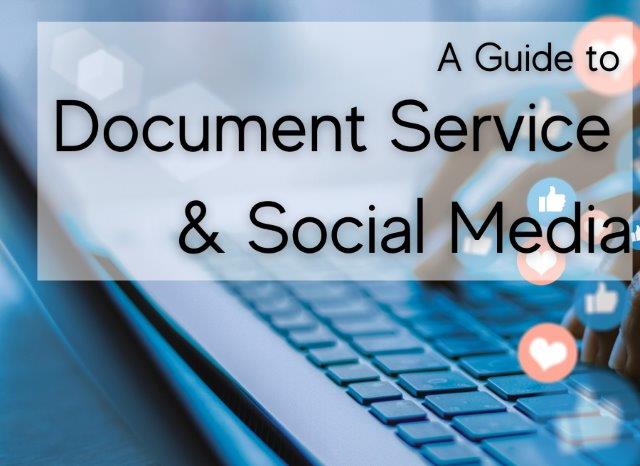When can documents be served through social media applications, and what are some of the problems?
Over the last five years we have seen social media applications, such as Facebook, being used more regularly as another option for serving documents, and this has increased even more post Covid19.
- Docuserve has a business Facebook and LinkedIn account that we use to serve documents, rather than a staff members personal account.
- We have served all types of documents, including family proceedings, civil proceedings, and dissolution of marriage proceedings by social media.
- Once we have served the document, we draw up an affidavit of service, exhibiting relevant screenshots highlighting the recipient’s profile, and the time and date the document was sent.
So why serve documents through social media?
In New Zealand social media, including platforms like Facebook, are usually only used to serve documents when personal service has not been an option. This could be because the person is being evasive and deliberately avoiding being found. Or it could be because no one knows the whereabouts of the recipient, simply because they have not been in contact with the plaintiff/ applicant for many years. If they do have a social media presence, then this may mean that a proceeding can continue rather than being stopped in its tracks.
A better option than email?
Email is a great method for sending documents to a recipient, if you have an accurate email address, and you get a response confirming receipt. But there are times when this is not a suitable option for service.
A large majority of people have social media accounts, and this number continues to grow each year. You can often see where a person is (i.e., are they on holiday), where they work, and how active they are on their pages. It means that even if they do not reply to you once you have served them, the fact that they are actively engaging in conversation with others, means that will have likely received your message (post) and document you have sent them. And depending on the application used, sometimes you can see if they have viewed or opened the post. Unlike email, you are not reliant on the recipient to reply, to confirm receipt.
Save on the need to engage international process servers

As the world continues to get smaller with the ability to connect quickly and easily digitally, it is possible in the future that we will be able to serve overseas respondents via social media in the first instance, without the need to attempt personal service first.
In countries where English is the first language the process for serving documents is usually much the same as here in New Zealand. We have agents in many overseas countries that assist us serving documents.
But in countries where English is not the first language, we have found that the process can be quite different, lengthy, and reasonably unreliable. Serving through a social media application could potentially simplify the process, mitigate the need to engage with an international agent, charging exorbitant international service fees, and ensure the process was managed in accordance with New Zealand Court requirements.
And with many countries on restricted movement due to Covid19, in some cases it is incredibly difficult to get documents served at all.
Covid19 and the need to social distance
With the ongoing challenges brought on by Covid19 and the need to social distance, serving by social media may become a more commonly accepted method for service, to bypass the need for personal service, simply for health and safety reasons.
When Can Documents Be Served on Social Media?
Currently in New Zealand, from our experience, serving by social media will only be considered if all other avenues to serve the person personally have been exhausted. An application can be submitted to the court asking that service by another means, other than personal service, be allowed. This is known as making an application for substituted service.
There are several types of substituted service that can be applied for. They can include serving a family member of the respondent at a particular address, affixing the document to the door at the respondent’s home, by email, or by handing the documents to a staff member at their place of work. In most cases the applicant needs to demonstrate that sufficient attempts to serve the person personally have been made. Part of our process is to record all service attempts in case this is required as part of such an application.
Back in 2009 the New Zealand High Court ruled that substituted service could be made on a defendant via Facebook, (Axe Market Gardens Limited v Axe) as newspaper advertising (back then this was a more common alternative for service) could not be effectively targeted. This set the precedent, and since then courts in New Zealand have continued to make orders allowing for service via Facebook.
In New Zealand, in our experience, when applying for an order for substituted service by social media it needs to be demonstrated that…
- All reasonable attempts at personal service have been made.
- The intended recipient has an active social media profile.
- That the intended recipient regularly uses the profile, and therefore it is reasonable to assume that they will receive any messages sent to them (or in this case documents) through this medium.
Other conditions that may need to be met will vary depending on the individual proceeding and the judge making the decision.
What are some of the problems serving documents by social media?
It may seem that serving by social media is the perfect solution for serving a person who has been avoiding service, or just cannot be located. But like anything there are always issues to consider.
Proving the profile belongs to the intended party
It is important to confirm that a person’s profile is legitimate before serving them with documents. On social media “spoofing” identities is common. That is where someone takes photos and information from a person’s real social media account and creates new profile that appears real – but it is not. An account that is only a few months old may raise some red flags. But an account that has been active for over five years is a good indication that it is genuine. You need to check when the account was created, and the amount of content that has been added over time. Does the amount of engagement add up, and the expected number of friends?
Making sure you don’t serve the wrong person
This would be a disaster! Ensuring you have the right account is critical. To shortcut this we always prefer the applicant (or a person who knows the recipient) to send us a link to the correct social media account (we primarily use Facebook). Especially if the person has a reasonably common name. If the applicant is not familiar with the account, then we will often send a profile picture for them to identify the recipient. Another clue to confirming a person’s account is to find out the names of family and friends and then check that these are the people who have been liking and commenting on the posts of the person in question.
Proving the intended person received the documents
This is why personal service is still the preferred method of service by the courts. Unless you receive a response confirming receipt no other type of service can ever one hundred percent confirm that the intended recipient received the intended documents.
- Yes, we can see that the documents were sent to them…
- Yes, we can sometimes see that they were received, and that the recipient has seen the post…
- But… was another person (like their child or partner) using their account at the time?
- Did they simply miss the notification – which can happen when a person is signed up to receive notifications for multiple things.
So, is document service by social media
the way of the future?
At this stage we see service by social media as another tool in our toolbox. It is unlikely to replace personal service any time soon, but it provides a reasonably secure alternative. We have seen this method used more and more over the last few years by the New Zealand Courts, and expect this to continue. We have served all types of documents, including dissolution of marriage, and civil proceedings.
If you have any questions about this method of service, please let us know.

